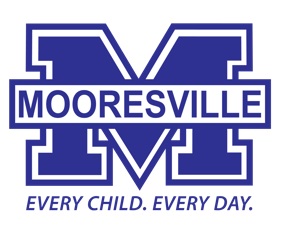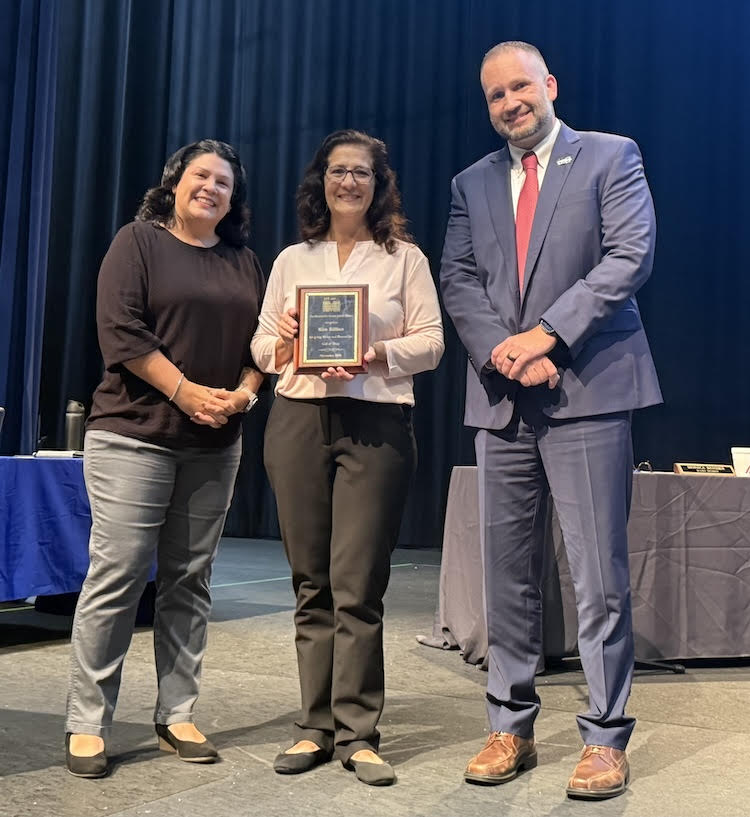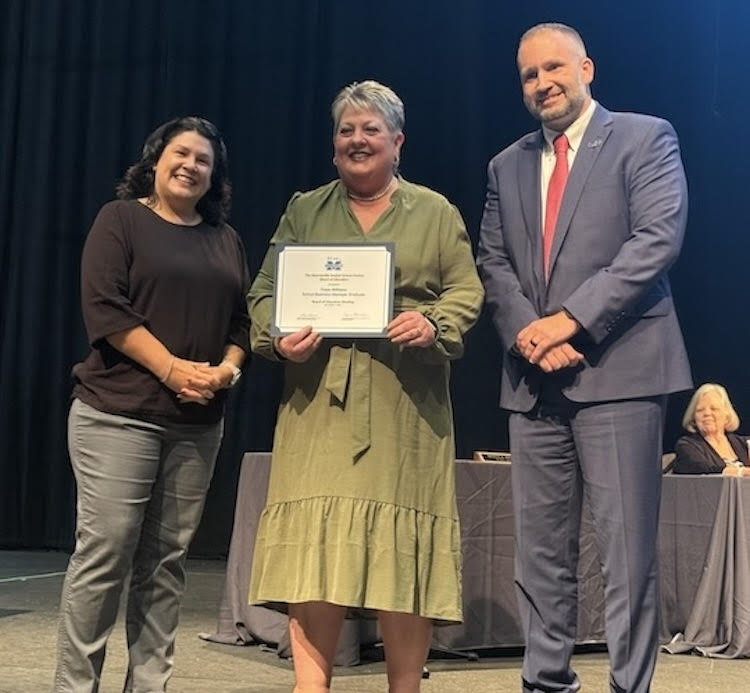
BY DEBBIE PAGE
The Mooresville Graded School District Board of Education approved its $86,767,209 budget for 2025-2026 budget on Monday night.
State revenues represent the majority of funding, with local revenues from Iredell County as well as the MGSD property tax also supporting operating expenses and capital projects.
Other than the additional construction funding in 2023, overall revenues have held somewhat steady, although expenses continue to increase, said Chief Financial Officer Angela Davis.
The state public school fund ($42,322,096.57) makes up 48 percent of the 2025-2026 budget. Local current expense funds make up 32.16 percent ($27,905,137) of budget revenues, with 5.32 ($4,613,350.64) from other current expense fund, 4.12 percent ($3,578,371.97) from federal program funds, 3.94 percent ($3,420,596) from capital outlay fund, 4.70 percent ($4,074,617) from child nutrition fund, and .98 percent ($853,040) from the Before and After School Fund.
According to the Office of State Budget Management, state revenues are anticipated to decline rapidly between now and fiscal year 2031 with a total revenue reduction of $5.6 billion, or approximately 13 percent.
Davis said this reduction comes after the N.C. General Assembly’s action under a 2023 budget compromise to reduce the personal and corporate income tax rates over the next few years.
In FY25, the Department of Public Instruction made up approximately 18.50 percent of the total state expenditures. If state revenues decrease, DPI’s and public school district revenues may decrease as well.
Davis said 76.12 percent of the MGSD budget goes to salaries and benefits, with 12.74 percent funding purchased services, 5.90 percent for supplies and materials, and 2.66 percent for capital outlay, with 2.57 percent being transferred to other funds.
Employee salaries and benefits make up the majority of MGSD expenditures. Davis noted that in light of a possible reduction in state funding, MGSD will need to prioritize positions to maximize funding and maintain a balanced budget.
Budget highlights include $4,458,000 budgeted to maintain 10 percent certified employee and 6 percent classified employee supplements. The budgt also includes $150,000 reappropriated for safety equipment.
The employer matching retirement rate is 24.67 percent, an increase of 0.63 percent from the past year. The employer matching health insurance rate is $8,500 per employee, an increase of $405 from 2024-2025.
Davis reported that the local fund balance, as of June 30, included $10,156,559 in other special revenue, $5,486,319 in capital, and $ 7,770,262 in general unassigned funds. The total combined fund balance of the general and other special revenue funds was $17.9 million.
Although that is a healthy number, to put it into perspective, MGSD spent roughly $6 million on October’s payroll, so Davis warned that $17.9 million could be exhausted pretty quickly in a crisis.
Davis also gave an overview of some additional funding sources available courtesy of the state lottery. Each “pot” of money comes with separate restrictions and rules:
♦ Public School Building Capital Fund – $ 3,973,128 (no matching requirement) for land, construction & equipment for schools;
♦ Needs-Based Capital – $ 330,000 (matching requirement) – for construction, repair or renovation of schools; and
♦ Repair & Renovation Fund – $ 433,297 (no matching requirement) for repair, renovation or enlargement of classroom facilities.
CELL PHONE POLICY CHANGES
This summer the N.C. General Assembly passed House Bill 959, otherwise known as the “cell phone bill.”
It applies to all wireless communication devices that have the capability to provide voice, messaging, or other data communication between two or more parties, including cellular telephones, tablet computers, laptop computers, paging devices, two-way radios, and gaming devices.
The bill requires that the governing body of a public school unit must establish a wireless communication policy. At a minimum, the policy will prohibit students from using, displaying, or having a wireless communication device turned on during instructional time.
A district’s wireless communication policy allows student use of a wireless communication device during instructional time if authorized by a teacher for educational purposes or for use in the event of an emergency, with the district establishing parameters to be followed by a teacher in granting authorizations.
The board is required to approve a policy by January.
Chief Communications Officer Tanae McLean presented two policy options to the board. One option is a complete ban on electronic device use from the start to the end of the school day. The second option is to ban electronic device use during instructional time, while allowing use between classes and during lunch.
MENTAL HEALTH PLAN APPROVED
The board approved the district’s state-mandated School Mental Health Plan (SMHP), which was presented by Chief Student Services Officer Sandy Albert and her team at the November meeting.
The plan was developed under state policy, which aims to strengthen student and staff well-being through evidence-based social-emotional learning (SEL) practices, mental health services, and community partnerships.
The SMHP includes strong district and school-based team structures supporting attendance, SEL and mental health as well as a comprehensive K–12 SEL curriculum using Quaver SEL, Capturing Kids’ Hearts, Character Strong, and BASE.
School teams and district staff are trained in trauma-informed and restorative practices, and the district has forged robust community partnerships and resource mapping as well as strong collaboration with a school-based mental health provider.
New focus areas in the updated plan, based upon collected data, include:
♦ Data sharing between schools, at the district level, and sharing out to the community;
♦ Addressing barriers to student access to school-based mental health;
♦ Improving Specialized Instructional Support Personnel (SISP) ratios. SISP staff include school social workers, school nurses, school psychologists, and school counselors; and
♦ Enhancing SEL and academic alignment
The SEL instructional Programs will occur at all levels, including:
♦ K–5: Quaver SEL and character education
♦ 6–8: Capturing Kids’ Hearts philosophy and lessons
♦ 9–12: Character Strong advisory lessons and peer mediation sessions
♦ NF Woods: BASE 7 Mindsets curriculum
Teams are also in place at each school utilizing trauma-informed and restorative practices, and all staff complete required mental health training through Vector. Various sources of data are being used as early warning signs that allow staff members to provide resources and support as needed.
The treatment, referral and re-entry plan offers school-based therapy services through Children’s Hope Alliance. Staff continuously evaluate any crisis situation using the MGSD Student Crisis Response Plan and Threat Assessment Protocols to ensure referrals are made to support the student as well as ensure school safety.
A community resource map, available on the district website, is updated annually and shared with families as needed. A standard re-entry plan has also been developed for school teams to utilize when students are returning to school following a hospitalization, suspension, or homebound placement.
To strengthen mental health services, the district plans to expand staff training in mental health awareness and resources and increase SISP staffing ratios through grants, community partnerships and Medicaid funding.
MGSD also will enhance SEL and academic alignment by working with school teams, using resources received from a neighboring district, and developing an MGSD SEL handbook.
The district will also expand innovative partnerships to support student and staff well-being, including a new collaboration with Iredell County to address student substance use and abuse.
Recognitions
STUDENT OF THE MONTH

Samantha Weibel and the East Mooresville Intermediate School Administrative Team nominated third-grader A.J. Davis as Student of the Month. He was described as a “shining example of the EMIS school values: Be Respectful, Be Responsible, and Be Kind.”
“Every morning, A.J. walks into school with a big smile and a polite greeting for everyone he sees. His cheerful attitude and friendly voice brighten everyone’s day, especially when he helps with the morning announcements, a favorite part of the day for many. AJ is always ready to lend a hand, especially to our SRO Officer. He is his deputy in Training. AJ is a friend to everyone and has gone out of his way to make sure everyone feels welcome and included. He consistently shows kindness and respect in everything he does. AJ is a true role model at EMIS.”
ARTIST OF THE MONTH

Art teacher Michelle Corbett nominated EMIS 4th grader Wyatt Martinas Artist of the Month.
Corbett said Wyatt always enters the art room with creative energy, respect for the projects, and an amazing sense of originality.
“Wyatt has been a member of our Art Club several times and seems to inspire others around him by embracing the projects and skills being taught. He is also always quick to help out in the art room. Wyatt is a joy to have in my class, and I look forward to seeing how his work builds and grows through the years.”
ABCD AWARD

Kim Killian, EMIS Exceptional Children Teacher’s Assistant, was nominated by Principal Tracy Pratt-Dixon and the EMIS Administrative Team for the Above and Beyond the Call of Duty recognition.
Killian has been an EMIS Eagle for some time now and held many different roles. She currently is serving as the EC TA.
“She is a true team player and always willing to help in any way possible. She loves working with students and helping them grow and succeed. She participates in all EMIS staff activities and exudes Eagle pride and enthusiasm in all that she does.”
SPOTLIGHT ON PEOPLE
Mooresville Middle School cross country teams


The MMS boys cross country team is pictured.
The Mooresville Middle School boys and girls cross country teams were honored for being undefeated in the conference and earning the Conference Champions honor.
The teams competed against six other schools throughout the fall at weekly two-mile races. This year, both teams finished the season undefeated in conference competition.
Additionally, they had the opportunity to race at Friday Night Lights, one of the largest meets in the Southeast, as well as the Pfeiffer University Invitational, where the girls won and the boys finished second in their respective divisions.
The MMS season concluded with the Conference Championship at Ellis Middle School.
Both the boys and girls teams claimed four of the top 10 places.
Team members are Elizabeth Albaeck, Lincoln Bell, Adah Bustle, Finley Cline, Asher Di Re, Dominic George, Juliette Govern, Jayden Gray, Landon Griffith, Tatiana Hanley, Kaden Helms, Colson Johnson, Jett Johnson, Daniel Kaemba, Taitlyn Lanning, Lucia Lawrence, Brody Matthews, Andrew Mead, Jordan Merrells, Christian Moncada, Nathan Morais, Kathryn Murphy, Bek Nacey, Eloise Neal, Mckenzie Pacini, Emma Parrott, Ryen Paul, Cohen Roseman, Andrew Sherrill, Mason Stewart, Peyton Thomas, Liam Wisniowski, Owen Wolf, and Ryan Xu.
The teams are coached by Troy Conley, Suzanne Harrington, Alexander Thornhill, and Kari Borowiak.
School Business Manager Graduate

Trena Williams, Payroll Specialist, was recognized for her achievement in completing the North Carolina Association of School Business Officials School Business Management Academy Manager Certification program.
From March through October 2025, Trena attended rigorous professional development courses, mastering crucial areas such as accounting, financial management, legal responsibilities, and business office operations.
Superintendent Jason Gardner said “her dedication to this comprehensive curriculum not only enhances her individual expertise but also directly supports our district’s strategic priority to recruit, grow, and retain exceptional talent. By investing in her professional growth, Trena has not only elevated her own skills but has also strengthened our entire organization.”
Spotlight on EIMS
The EMIS administration presented two programs that the staff uses to increase students’ reading comprehension and engagement in their learning:
♦ Reading Detectives
Fourth-graders are becoming Reading Detectives, armed with “Top Secret Detective Notebooks” and magnifying glasses, and reading for clues within complex text to solve mysteries.
Students jot their notes and work together to write their claims. They must use three pieces of supportive evidence to prove their claims. The students then use a Socratic seminar to present their solutions. They each share and prove their case. When the solution is revealed, students then celebrate their ideas.
This engaging strategy teaches students how to find evidence within complex text. In addition, students learn to use the evidence to support their ideas in collaborative discussions.
♦ PODCAST Power
The PODCAST Power program helps amplifying student voice and literacy skills. Students select topics and shape their message to share with an authentic audience. The real world format motivates reluctant writers and readers.
The integration of multiple skills supports comprehension, fluency, and collaboration and can be used across subjects. The podcasts also promote creativity with students’ addition of special features.



